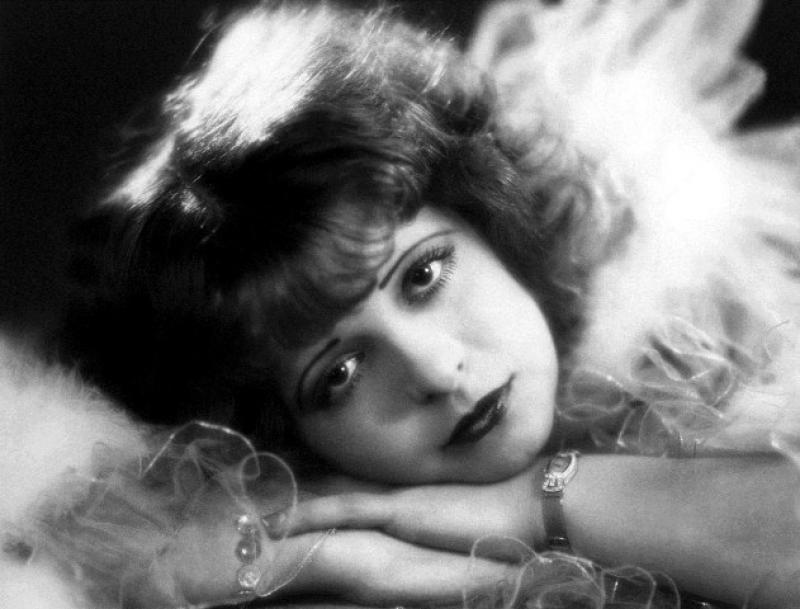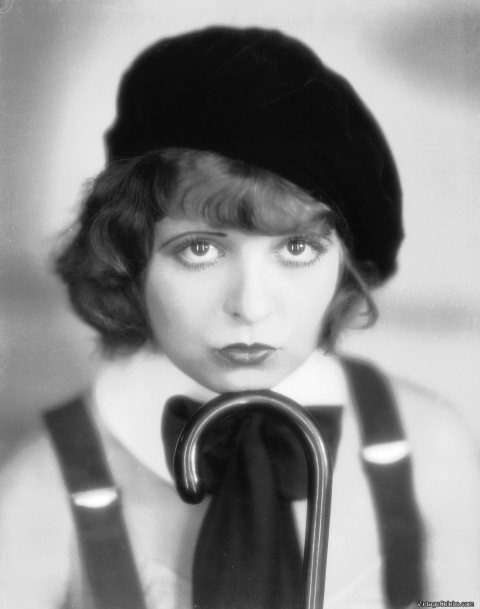Hollywood’s Lost Screen Goddess: Clara Bow, BBC Four | reviews, news & interviews
Hollywood’s Lost Screen Goddess: Clara Bow, BBC Four
Hollywood’s Lost Screen Goddess: Clara Bow, BBC Four
Poignant tribute to the silent era’s luminous 'It' girl

“Knowing Clara Bow brought you down socially”. Although one of the biggest and most bankable film stars of the Twenties, luminous fan-favourite Clara Bow wasn’t so treasured by the Hollywood elite. She didn’t hide her affairs. She turned up for dinner in a swimsuit. Her father was an alcoholic and banned from sets. She revealed her deprived background to the press, undermining the myth that stars sprang fully formed from the Elysian Fields.
The "lost" in the title of this BBC Four film is, however, a relative concept, especially as it was a partial retread of 1999's Courtney Love-narrated documentary Discovering the It Girl. Bow was a major star, and her name hasn’t been completely forgotten. Similarly massive screen presences of the age, such as Colleen Moore, Mae Murray, Mabel Normand and Constance and Norma Talmadge also deserve in-depth documentaries, and have personal stories as compelling as Bow’s - though not quite as heart-rending. And unlike them, Bow literally defined an era. She actually was the “It" girl.
 This was a heavyweight documentary, as testified by contributions from Brownlow and Leonard Maltin. It was also non-judgmental and matter of fact. Talking heads were relevant and had meaningful contributions. There was only one instance of the usual crass “she was the Madonna / Spice Girls / Lady Gaga of her day”-type comment, in this case a reference to Sex and the City.
This was a heavyweight documentary, as testified by contributions from Brownlow and Leonard Maltin. It was also non-judgmental and matter of fact. Talking heads were relevant and had meaningful contributions. There was only one instance of the usual crass “she was the Madonna / Spice Girls / Lady Gaga of her day”-type comment, in this case a reference to Sex and the City.
Bow was a magnet, the camera drawn by her combination of gawk, ordinariness, beauty and sexual power. Brought up in the slums of Brooklyn, her father was soaked in alcohol, her mother unstable: upon learning of her daughter entering a competition in Motion Picture Magazine, she threatened Clara with a knife. Bow won and secured a film role; her mother ended up in a mental institution.
 Although her first screen part was consigned to the cutting room floor, Bow was soon flying and off to Hollywood in 1922. Her father followed and lived off her earnings. In 1925, aged 20, she made 15 films. With little education and no training in acting, Bow was on fire and being burnt up. A self-professed tomboy, she exuded naturalness, even in a posh frock. Forty-six films were completed in her first seven years in cinema. Her reputation was cemented after her studio colluded with the British author Elinor Glyn, whose novel It defined the woman of the era – the carefree flapper. With Bow in the film adaptation, she personified the “It" girl. After a hiccup or two she even survived the arrival of the talkies.
Although her first screen part was consigned to the cutting room floor, Bow was soon flying and off to Hollywood in 1922. Her father followed and lived off her earnings. In 1925, aged 20, she made 15 films. With little education and no training in acting, Bow was on fire and being burnt up. A self-professed tomboy, she exuded naturalness, even in a posh frock. Forty-six films were completed in her first seven years in cinema. Her reputation was cemented after her studio colluded with the British author Elinor Glyn, whose novel It defined the woman of the era – the carefree flapper. With Bow in the film adaptation, she personified the “It" girl. After a hiccup or two she even survived the arrival of the talkies.
It wasn’t changes in filmmaking that led to Bow’s departure from the screens, but the nexus of her public persona and who she really was. A chronic insomniac, she gambled, had affairs – and hid nothing. Scandal sheets went further, making up stories of drug addiction, bestiality and incest. The concocter of these tales ended up in jail, but mud sticks and Bow had a breakdown. At 25, she left Hollywood, moved to a Nevada ranch with husband Rex Bell, and made just two more films. Her cinema careeer was over, terminated by her own hand. Later diagnosed with schizophrenia and hospitalised (of her own volition), she moved to suburban Los Angeles in 1950 and died in 1965.
Whether Bow’s family history meant she was predisposed to mental illness or whether it was caused by the pressure exerted by Hollywood wasn’t clear. Yet deciding to exit the studio treadmill must have taken enormous courage and strength. Bow recently influenced the look of The Artist's Peppy Miller, but style was only one part of her equation. As this tribute amply illustrated, she was an exceptional person, with tremendous depths. She also lit up the cinema screen.
Watch an extract from Clara Bow's It (1927)
Add comment
The future of Arts Journalism
You can stop theartsdesk.com closing!
We urgently need financing to survive. Our fundraising drive has thus far raised £49,000 but we need to reach £100,000 or we will be forced to close. Please contribute here: https://gofund.me/c3f6033d
And if you can forward this information to anyone who might assist, we’d be grateful.

Subscribe to theartsdesk.com
Thank you for continuing to read our work on theartsdesk.com. For unlimited access to every article in its entirety, including our archive of more than 15,000 pieces, we're asking for £5 per month or £40 per year. We feel it's a very good deal, and hope you do too.
To take a subscription now simply click here.
And if you're looking for that extra gift for a friend or family member, why not treat them to a theartsdesk.com gift subscription?

Comments
watched this docu with